
1 Art
I’m a sucker for illustrated books. Maybe it’s because I’ve been reading almost nothing else for the past eight years. So when I saw this illustrated version of Christina Rosetti’s “Goblin Market, “ I started salivating like a Pavlovian dog: pretty words plus pretty pictures equals drooly writer mama.
But I quickly stopped drooling and started smiling when I saw the photos in Ruth Kaiser’s new book, a collection of happy-making pictures of found smiley faces paired with zippy jingles. My hands-down favorite was the macaroni-and-cheese. Yours?
What do you get when you cross paintings from the National Gallery in London with ekphrastic poetry? Anyone? Well, if you’re Paul Durcan, you get a play. And even though there’s no hope that I’ll get to see this play (I live in Seattle; it’s playing in New York), it sounded so intriguing I couldn’t resist passing it along.
2 News
A group in Italy is calling on Italian schools and universities to ban Dante’s Divine Comedy. They claim that students are being poisoned by the epic’s homophobic, “racist, Islamaphobic, and anti-Semitic” rhetoric because they lack the appropriate filters to be able to understand the historical and cultural context of the Comedy. Presumably their teachers also lack those filters and are unwittingly promulgating this hate speech in classrooms across Italy. Down with Dante!
In happier news, the Scottish Poetry Library is curating a broadcast of 204 poems, one from each of the countries that will be participating in this summer’s Olympics in London. Each poem captures a taste of the country it’s from and will be read in English by someone either from or with connections to that country. Having read just a few of the selections, I can tell you there’s some beautiful poetry out there in this big world.
3 Publishing
I’m not a fan of e-books. I believe in books as decoration (as well edification, of course). And e-books just don’t look as pretty on my bookshelf, not to mention they’re too expensive to decorate with. I know. I know. I need to get with the program, enter the 21st century (and maybe choose some new cliches). Enter this article on The Way We Read Now. It advised on which device is best for which type of books—though I get the feeling Dwight Garner doesn’t stay home with four children who think his smart phone is a either a chew-toy or a video game console (he actually reads books on the thing!). The bad news for readers of this blog? Poetry just doesn’t translate to the screen:
There’s not enough white space, nor silence. The poems seem shrunken and trapped, like lobsters half-dead in a supermarket glass pen, their claws rubber-banded. Poems should be printed on paper, or carved onto the dried husks of coconuts, so one can hoard them.
While Mr. Garner doesn’t dig poetry via his e-reader, Joe Pan, founder of Brooklyn Arts Press, has a completely different view of e-readers and poetry. Here’s a fascinating interview about the founding of Brooklyn Arts Press and the work it takes to keep it going, plus his take on poetry e-books.
For writers of poetry, Tupelo Press is hosting their annual First/Second Book Award, which includes cash, publication, promotion, and publicity. But only if you win.
4 Reviews
Alex Ashlock mulls over Mark Strand’s most recent book of poetry, Almost Invisible:
In a short book about [Edward] Hopper, Strand described the people in Hopper’s paintings like “Nighthawks” as “characters whose parts have deserted them and now, trapped in the space of their waiting, must keep themselves company with no clear place to go, no future.” You might say the same thing about the characters in the poetry Mark Strand is writing today.
And for all you poet-mamas and papas out there, this spring brings five new collections of children’s poetry, which look so good I want them all. My library only has two of them (still on order, though I’m first in line to get them when they come in—woot!), so I had to order the other three books. It’s a rough life, but someone has to support all those poor poets out there.
5 Creativity
I am not a fan of blank canvases. You know, the ones that hang in museums and claim to be art. I just don’t get them. Then I read this fascinating article about the creativity inherent in Nothingness—a story of dark matter, a blank canvas, art, and poetry. I’m afraid I’m going to have to approach my next blank museum canvas with less hostility and more humility.
Speaking of humility, this interview with Ethan Iverson of The Bad Plus, a jazz-trio, taps into the creativity that emerges in a context of collaboration. There are a lot of gems in this interview, but this is one of my favorites; Iverson’s talking about the danger of artists becoming self-important and therefore (he thinks) boring:
I prefer to think that it’s possible to always sort of double-check yourself and be like, “Is this really the right thing?” and be searching. The classic jazz example is John Coltrane: consummate musician, but really never stopped searching. I don’t think he ever believed the hype about himself. He could’ve been like, “Man, I got it, I’m great.” But that’s not the feeling you get. Coltrane was incomparably great, but he was also just humbly trying to figure it out.
6 Write-It
Next month is National Poetry Month, but NPR is getting a head start. They’re hosting a Twitter Poetry slam, starting now. All you Tweetspeak fans ought to fit right in! You might even be able to kill two birds with one stone: this month’s Twitter poetry party is tonight. Join us? We’ll even send out the pink limo for you.
7 Poems
Even though I was an English major and write a twice-monthly poetry column, I confess that when I read James Cummins’ “Epithalamium, ” I had to look up the title. It’s just a fancy word for wedding poem. But you already knew that.
Epithalamium
I tell you, I felt like an elephant
that night, the night of the harvest.
Each furrow put on airs in the moonlight,
and the stars were so much confetti
that took more than one lifetime to fall …
Read the rest of Epithalamium.
When I read these old but still lovely lines by Ben Jonson, I just had to share them with you. Jonson, by the way, also wrote an epithalamium or two.
8 People
Katherine Larson is a molecular biologist. She’s also a poet (winner of last year’s Yale Series of Younger Poets competition and last month’s Kate Tufts Discovery Award). Science informs her poetry—pomegranates, cancer cells, bleeding maples, gills folded like satin—and poetry allows her to explore and even push beyond the epistemological limits of science, of which she writes: “every time I make love for love’s sake, I betray you.” Good stuff, Maynard.
9 Education
This poem claims books make the best education. I agree. I’ve long believed that reading good books makes you smarter and more empathetic. Of course, I was just conjecturing about that whole smarter/kinder thing, but since it’s always helpful to invoke intelligence and empathy to justify the things we enjoy, I embraced the conjecture as absolute truth. New brain research, though, shows that I was right:
[There is] substantial overlap in the brain networks used to understand stories and the networks used to navigate interactions with other individuals — in particular, interactions in which we’re trying to figure out the thoughts and feelings of others. Scientists call this capacity of the brain to construct a map of other people’s intentions “theory of mind.” Narratives offer a unique opportunity to engage this capacity, as we identify with characters’ longings and frustrations, guess at their hidden motives and track their encounters with friends and enemies, neighbors and lovers.
Told you so.
10 Sound n Motion
I’m not sure this technically counts as poetry-related, but it’s pretty dang inspiring: At 90, Ralph Baer, inventor of the video game, is still dreaming up and designing new ideas. Honestly, I think he’s a poem.
Foodie that I am, I found Rachel Khoo’s tiny Parisian restaurant a bit poetic, too. Her bacon tart looks worthy of an ode.
And since it’s becoming tradition for me to end with Milton, here’s Ian Richardson reading Satan’s speech from Book One of Paradise Lost.
Photos by Claire Burge. Used with permission. Post by Kimberlee Conway Ireton, author of The Circle of Seasons: Meeting God in the Church Year
___________
Buy a year of Every Day Poems, just $5.99— Read a poem a day, become a better poet. In March we’re exploring the theme Angels.
- Top 10 YA and Children’s Books - July 25, 2014
- Literary Birthdays: Dorothy Sayers’ Gaudy Night - June 13, 2014
- Literary Birthdays: C.S. Lewis, Louisa May Alcott, Madeleine L’Engle - November 29, 2013
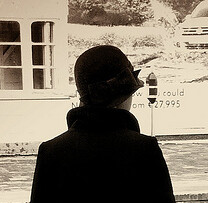
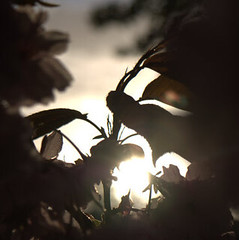


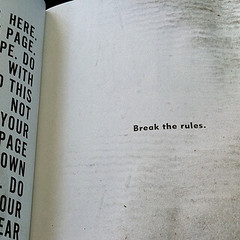
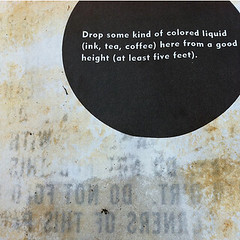


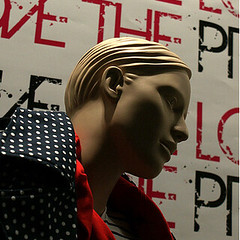


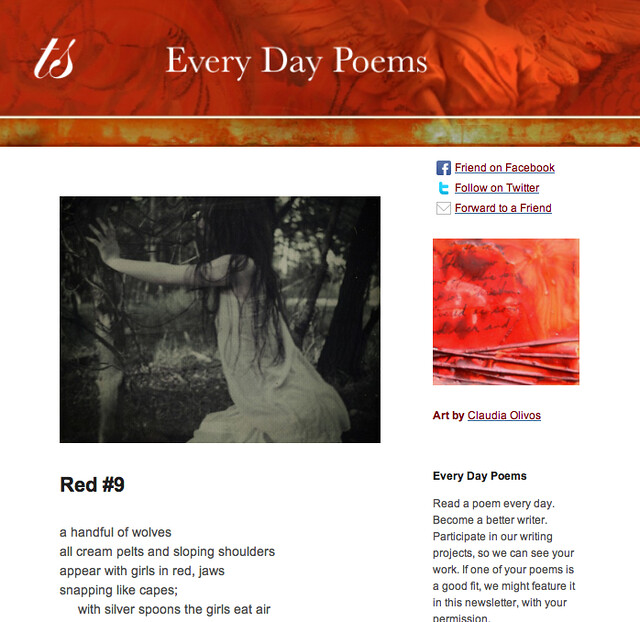
L. L. Barkat says
That video of Ralph Baer is just too wonderful. Poignant and funny both! (Loving all of these links. Can’t wait to jump in!)
L. L. Barkat says
Oh gosh, do you think Kimberlee was eavesdropping on our “ding” conversation? Or maybe great minds just salivate alike 🙂
Maureen Doallas says
Wonderful illustrations in “Goblin Market”. The title alone raises so many images.
The Baer video’s also excellent.
Great links!
Will Willingham says
Look, Laura. Another Pavlovian. 😉
Looks like a great collection, again. Will have to get after them later today — especially looking forward to the scientist’s poetry and the dark matter.
Joel E. Jacobson says
Thanks for the link on the brain research and reading. In Colorado, the newest state standards replace fiction with “real-world” reading (nonfiction, memoir, research, etc.). I’ve forwarded this link on to my peers. Thanks!
Kimberlee Conway Ireton says
Maureen, Yes!: The words “Goblin Market” conjure up all sorts of images both wonderful and horrible.
Kimberlee Conway Ireton says
Joel, I loved that article about fiction and neuroscience. I’m horrified to hear about Colorado’s new standards. Non-fiction and memoir are wonderful genres, but why must we exclude fiction and poetry? It drives me crazy the way educationists work in generalities instead of particularities–but given that they do, it’s hardly surprising they’d decide that fiction and poetry, which are necessarily particular, are superfluous. Okay, I’m about to go into rant mode, so I’d better stop there!
Simply Darlene says
For sure and for certain that pink limo will NOT make it up my road. You’ll need to send the 4wd limo truck for me (and of course a tweeter tutor for the non-twitter turkey that I am).
You’d think that a girl with a ride like this could tweet.
http://www.remarkablecars.com/monster-truck-limo.html
Thanks for all this brain food, miss Kimberlee. (Did you ever catch your home invader?)
Blessings.
Kimberlee Conway Ireton says
Dings? What? My powers of ESP clearly don’t reach that far 🙂
L. L. Barkat says
might these work for you, Darlene? 🙂
http://pinterest.com/pin/255720085061413418/
Simply Darlene says
Perhaps, miss LL. But I’m too sure about the pink. We used to have a brown Jeep. It drove over curbs and across sidewalks… not by itself, usually when I was behind the wheel.
This is my rig. For real.
http://aspiretoleadaquietlife.blogspot.com/2009/09/hickville.html
I’ll try to make it. I might come disguised though…
Blessings.
L. L. Barkat says
Oh gosh, look at those deer being all help-yourself-thank-you! 🙂
Matthew Kreider says
Kimberlee and Joel: In my own high school English classroom, I’ve shed a few tears over these defeats, too. Yet I still believe. Poetry makes me.